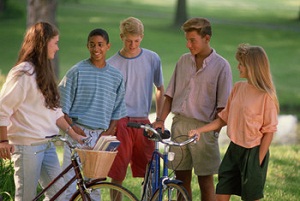Understanding the Social Needs of Gifted Learners
Posted by PLB · Leave a Comment

 Family, school, and peers present external elements which play on the social needs of gifted students.
Family, school, and peers present external elements which play on the social needs of gifted students.
As with all children, family dynamics are most critical to the healthy development of a gifted child. Environments ripe with permissiveness, neglect or excessive strictness can have a negative impact on a gifted learner.
In a school setting, the placement of a gifted child in a regular classroom often results in the student feeling frustrated, bored and rejected. Sometimes their healthy work ethic disintegrates and disappears altogether when it becomes apparent to them that they are not developing academically. In other words, when the challenge is too little, opportunity for intellectual growth is limited.
Some gifted children have advanced perceptions of friendship, and from an early age seek out companions who are older. Others may conceal their advanced abilities from their peers in order to avoid being bullied and to seem more “average”.
The social needs of gifted learners to be accepted, pressurize them to “fit in”. Gifted students in middle and secondary schools are aware of their uniqueness and will often work hard to play down their abilities in order to not stand-out from their peer group.
How can you ensure that these needs are met in your classroom?
From Professional Learning Board’s online continuing education course for teachers: Differentiation for Gifted Learners in the Classroom



